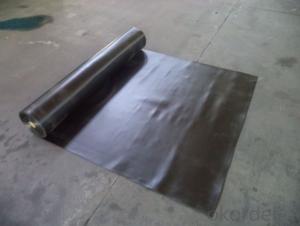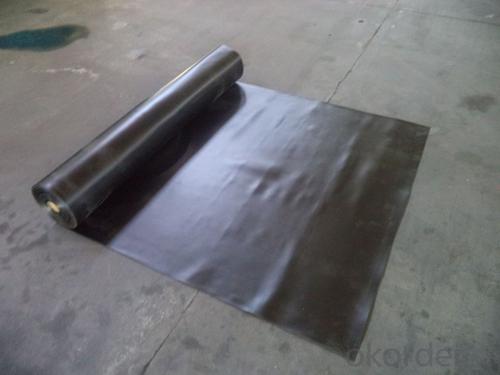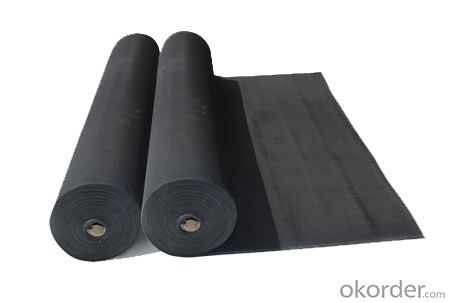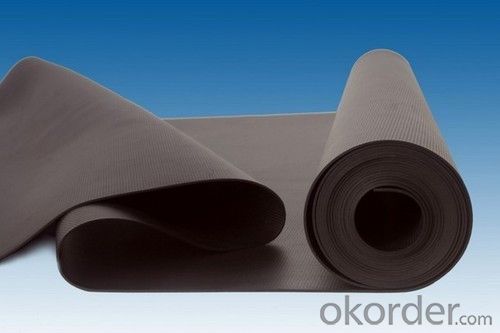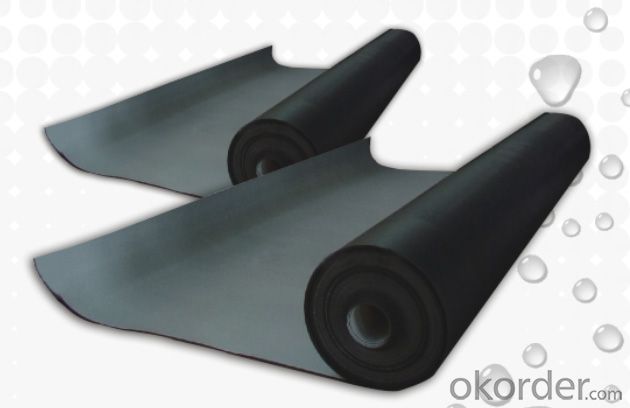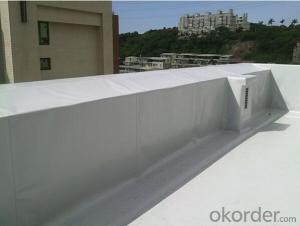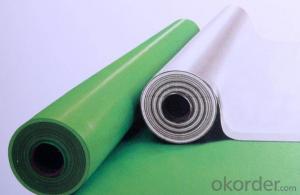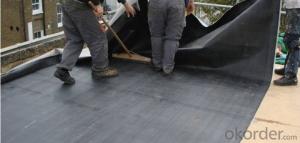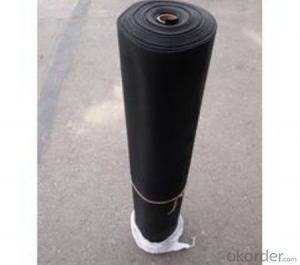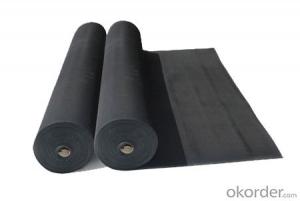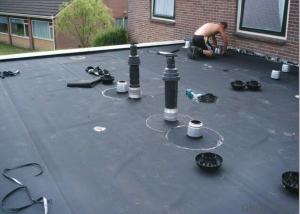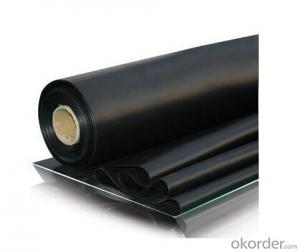EPDM Waterproof Vulcanized Membrane with 2.0mm Thickness
- Loading Port:
- Shanghai
- Payment Terms:
- TT or LC
- Min Order Qty:
- 20000 m²
- Supply Capability:
- 5000000 m²/month
OKorder Service Pledge
OKorder Financial Service
You Might Also Like
EPDM Waterproof Vulcanized Membrane with 2.0mm Thickness
Description Of EPDM Waterproof Vulcanized Membrane with 2.0mm Thickness:
1. EPDM waterproof membrane is made from ternary ethylene-propylene rubber, which is for waterproofing of exposed and non-exposed applications.
2. EPDM waterproof membrane production adopts the world-advanced equipment of cold feeding extrusion and continuous vulcanization technology.
3. EPDM waterproof membrane is of high elasticity among high polymer waterproof materials and becomes a world-popular waterproofing material.
Main Features of EPDM Waterproof Vulcanized Membrane with 2.0mm Thickness:
1.Excellent anti-aging performance, service life can reach 50 years;
2.High elongation, high tensile strength, heat treatment size change small;
3.Plant root penetration resistance is good
4.Good low temperature flexibility
5.Application is convenient, overlapping is firm and reliable, no environmental pollution;
6. Resistance to chemical corrosion, can be applied to special places;
7.Maintenance is convenient, the cost is low
Specifications of EPDM Waterproof Vulcanized Membrane with 2.0mm Thickness:
ITEM | STANDARO REQUEST | |
Tensile strength at breaking,normal temperature,Mpa | ≥7.5 | |
Elongation at breaking, % | ≥450 | |
Tearing strenght,KN/m | ≥25 | |
Bending at low temperature | ≤-40°C | |
Water impermeability,0.1Mpa×30min | Impermeability | |
Hot air aging 80°C×168h | Unchanging of tensile strength at breaking,% | ≥80 |
Unchanging of elongation at breaking,% | ≥70 | |
Appearance of 100% elongation | No crack | |
Property of anti alkali 10% Ca(OH)2×168h normal temperature | ≥80 | |
≥80 | ||
Applications of EPDM Waterproof Vulcanized Membrane with 2.0mm Thickness:
1.Roofs, Basement, Toilets
2. Industrial and civil building waterproofing
3. Geosynthetic liner for swimming pool, channels, irrigation system
4. Especially suitable for projects with high requirements in durability, anti-corrosion and deformation.
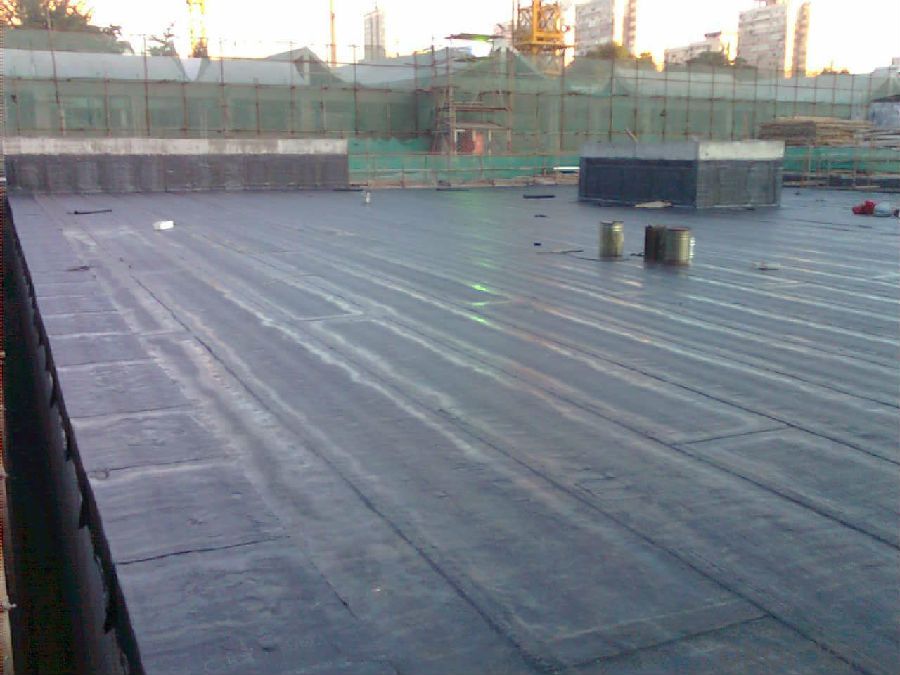
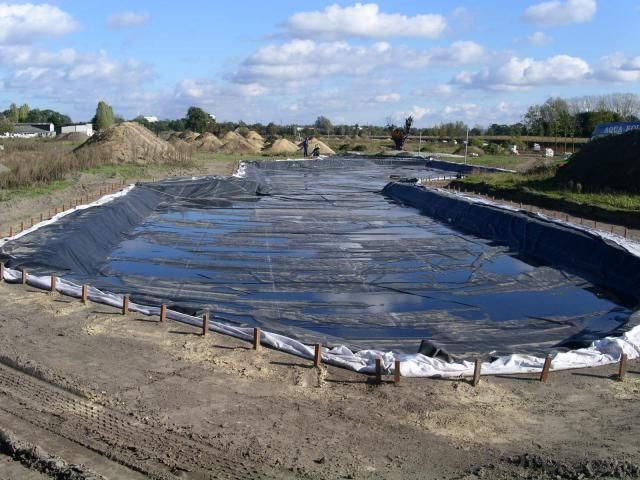
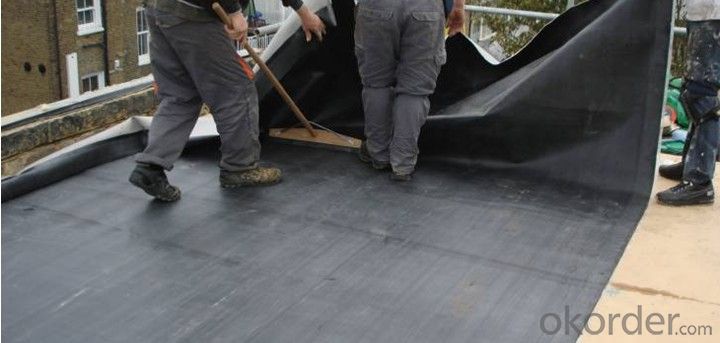
IMages of EPDM Waterproof Vulcanized Membrane with 2.0mm Thickness:
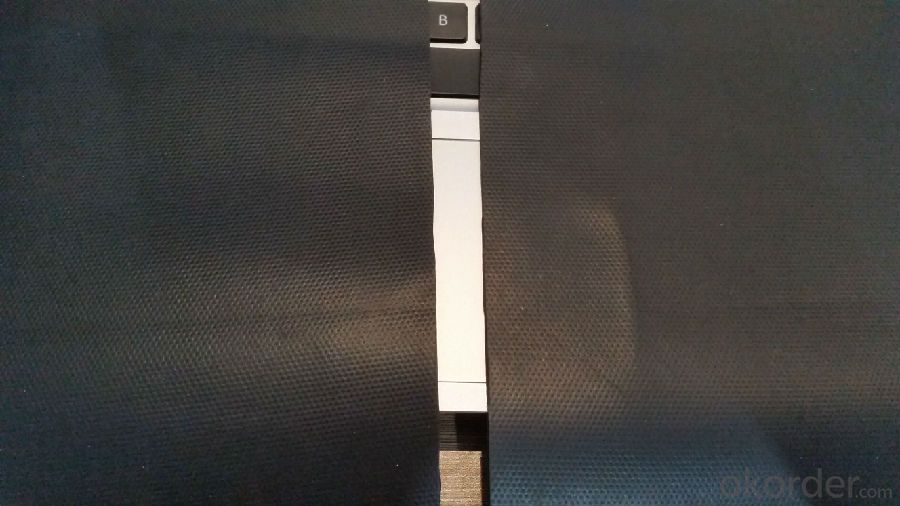
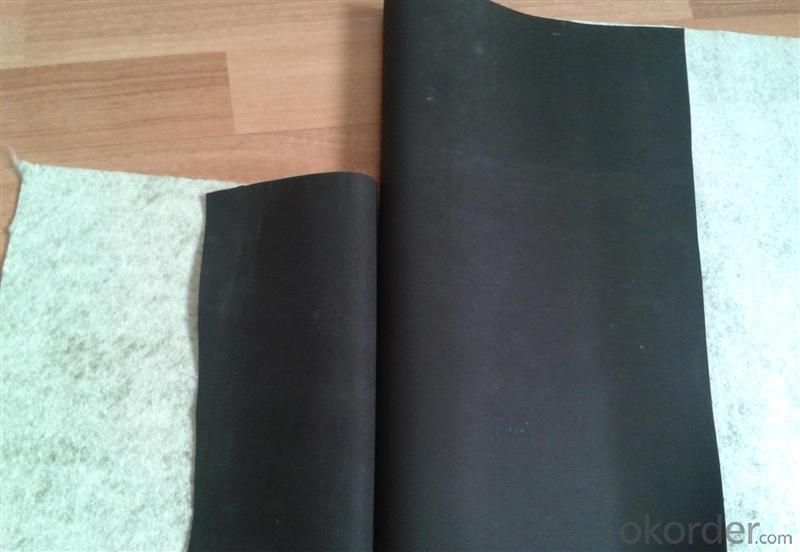
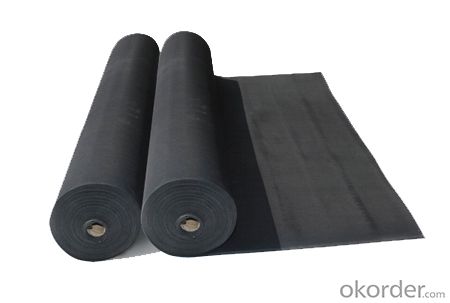
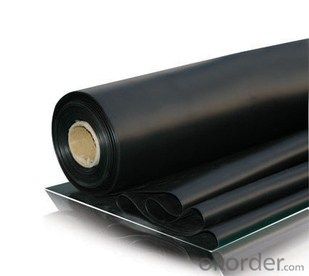
FAQ of EPDM EPDM Waterproof Vulcanized Membrane with 2.0mm Thickness:
1. What are we supplying?
We are specialized in producing Colorful Asphalt Roof Shingle, SBS/APP modified bitumen waterproof membrane, Self adhesive bitumen waterproof membrane, PVC waterproofing membrane, EPDM rubber roofing membrane, Single Component Polyurethane Waterproof Coating, and Spray Polyurea Waterproof Coating
.
2. How Many years experience do we have?
We have been exported to more than 20 countries in the past 15 years.
3. How long do we usually reply your request?
We always reply our customer within 24 hours.
- Q: Does a waterproofing membrane prevent water infiltration through concrete?
- Yes, a waterproofing membrane is designed to prevent water infiltration through concrete. It acts as a barrier, preventing water from seeping through the concrete and causing damage.
- Q: Can a waterproofing membrane be used on planter boxes?
- Yes, a waterproofing membrane can be used on planter boxes to prevent water leakage and protect the structure of the boxes.
- Q: Can waterproofing membranes be used on concrete dams?
- Concrete dams can indeed benefit from the application of waterproofing membranes. In fact, they are widely utilized in the construction and upkeep of such dams to prevent water from leaking or seeping through. The purpose of these membranes is to establish a water-resistant barrier, safeguarding the concrete surface of the dam against potential water-induced harm. Notably, these membranes can be administered to both the interior and exterior facets of the dam, presenting a reliable and enduring solution for waterproofing. Moreover, they can effectively lessen the likelihood of water-related deterioration, including freeze-thaw damage and reinforcement corrosion, thus prolonging the lifespan of the concrete dam.
- Q: What are the different types of waterproofing membranes?
- Construction and building projects commonly utilize various types of waterproofing membranes to prevent water penetration through walls, roofs, or other structures. These membranes can be applied to different surfaces. 1. Bituminous Membranes: Comprised of bitumen, polymers, and reinforcement materials like fiberglass or polyester, bituminous waterproofing membranes are frequently employed in roofing applications. They can be applied using hot or cold processes and offer outstanding waterproofing properties and durability. 2. PVC Membranes: Synthetic PVC membranes exhibit high resistance to water, chemicals, and UV radiation. They are often used in roofing applications, particularly for flat or low-slope roofs. PVC membranes are lightweight, flexible, and easy to install, boasting long-lasting waterproofing protection while being puncture and tear-resistant. 3. EPDM Membranes: Synthetic rubber EPDM membranes find common use in roofing applications. These membranes are highly durable, flexible, and resistant to UV radiation, ozone, and extreme temperatures. They can be installed as a single-ply membrane or in combination with other materials. 4. TPO Membranes: TPO membranes, a type of single-ply roofing membrane, are commonly employed in commercial and industrial settings. Composed of polymer blends and reinforcement materials, TPO membranes exhibit high resistance to water, chemicals, and UV radiation. They are lightweight, flexible, and easy to install. 5. Liquid Applied Membranes: Liquid applied membranes are an application type where the waterproofing system is initially liquid and cures to form a seamless and flexible membrane. These membranes can be made from various materials such as acrylic, polyurethane, or rubber-based compounds. They are often used for below-grade applications like basements or foundations, as well as roofs or other surfaces. To ensure effective and long-lasting waterproofing protection, it is crucial to consider the specific project requirements and consult with professionals to determine the most suitable type of waterproofing membrane.
- Q: Pvc waterproof membrane of the scope of application
- 3, with good weldability, seam hot air welding and the substrate into one; 4, with good water vapor diffusion, condensate easy to release; 5, low temperature flexibility is good, to adapt to the environmental temperature difference is good;
- Q: Does a waterproofing membrane require any protective coatings or sealants?
- In order to enhance its performance and durability, a waterproofing membrane typically needs some form of protective coatings or sealants. While the membrane itself provides waterproofing to some extent, it may not be enough to withstand all environmental conditions or potential damage. To create an extra barrier against water intrusion, UV radiation, mechanical stress, and chemical exposure, it is advisable to apply protective coatings or sealants on top of the membrane. These coatings or sealants also offer additional flexibility, strength, and protection against wear and tear. To determine the suitable type of coating or sealant for the specific membrane and project requirements, it is essential to seek advice from a professional waterproofing specialist.
- Q: Are waterproofing membranes resistant to acid exposure?
- Waterproofing membranes can vary in their resistance to acid exposure depending on the specific type of membrane being used. Some waterproofing membranes are designed to be resistant to acid exposure, while others may not be. It is crucial to carefully select the appropriate waterproofing membrane for the specific application and environment where acid exposure may be a concern. It is also advisable to consult with manufacturers or industry experts to determine the best waterproofing membrane solution for acid-prone areas.
- Q: Is a waterproofing membrane effective at preventing water leaks?
- A waterproofing membrane is an extremely effective solution for preventing water leaks. It serves as a thin layer of material that can be applied to various surfaces, including roofs, walls, and foundations. By creating a barrier against water penetration, this membrane acts as a protective shield, keeping water from seeping through and causing leaks. Its design ensures high resistance to water, allowing it to remain intact even during heavy rainfall or in moist conditions. Moreover, waterproofing membranes possess flexibility, enabling them to adapt to the movement of the underlying structure without compromising their effectiveness. Whether utilized in construction, plumbing, or even in everyday items like shower curtains, a waterproofing membrane plays a vital role in averting water leaks and upholding a dry and secure environment.
- Q: Can a waterproofing membrane be used for a shower enclosure?
- Indeed, it is possible to utilize a waterproofing membrane for the purpose of a shower enclosure. Waterproofing membranes possess the capability to impede the infiltration of water through various surfaces, consequently preventing any potential harm. Within a shower enclosure, where water exposure is exceedingly pronounced, application of a waterproofing membrane on both the walls and floor is highly advisable in order to establish a safeguarding barrier. This measure serves the purpose of guaranteeing that water does not permeate the encompassing structure, thereby averting predicaments such as mold proliferation, decay, and water-induced impairment. To attain optimal outcomes, it is crucial to opt for a waterproofing membrane specifically tailored for showers and adhere to the manufacturer's guidelines for accurate installation.
- Q: Can a waterproofing membrane be used on stone block surfaces?
- Yes, a waterproofing membrane can be used on stone block surfaces. The membrane creates a protective barrier that prevents water penetration and helps to maintain the integrity of the stone blocks. However, it is essential to ensure that the appropriate type of waterproofing membrane is selected and installed correctly to ensure proper adhesion and durability on the stone surface.
Send your message to us
EPDM Waterproof Vulcanized Membrane with 2.0mm Thickness
- Loading Port:
- Shanghai
- Payment Terms:
- TT or LC
- Min Order Qty:
- 20000 m²
- Supply Capability:
- 5000000 m²/month
OKorder Service Pledge
OKorder Financial Service
Similar products
Hot products
Hot Searches
Related keywords
